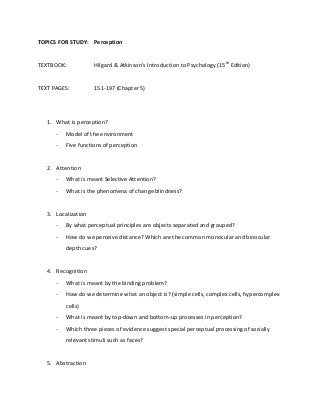
Lecture3-Chapter5 outline perception.. Dr.Anna
- 1. TOPICS FOR STUDY: Perception TEXTBOOK: Hilgard & Atkinson’s Introduction to Psychology (15th Edition) TEXT PAGES: 151-197 (Chapter 5) 1. What is perception? - Model of the environment - Five functions of perception 2. Attention - What is meant Selective Attention? - What is the phenomena of change blindness? 3. Localization - By what perceptual principles are objects separated and grouped? - How do we perceive distance? Which are the common monocular and binocular depth cues? 4. Recognition - What is meant by the binding problem? - How do we determine what an object is? (simple cells, complex cells, hypercomplex cells) - What is meant by top-down and bottom-up processes in perception? - Which three pieces of evidence suggest special perceptual processing of socially relevant stimuli such as faces? 5. Abstraction
- 2. - What are the advantages of abstraction? 6. Perceptual Constancies - What is meant by size constancy, shape constancy, color and brightness constancy? 7. Perception and the Brain - Where is the Visual Cortex? - Recognition versus Localization systems 8. Perceptual Development - Methods of investigation perception in children (preferential looking, habituation) - What can one conclude about the development of perceptual abilities from controlled stimulation studies?